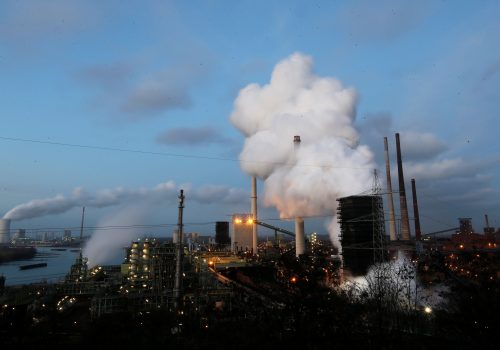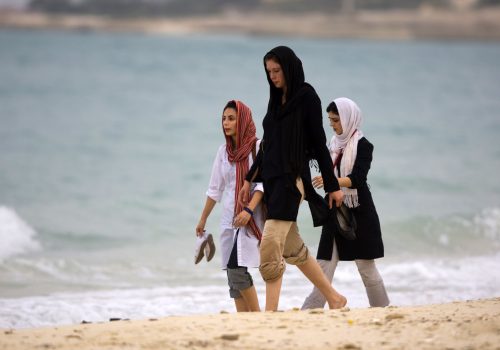FAST THINKING: What the UN climate report didn’t say
JUST IN
It’s getting hot in here. In the coming decades, the planet will heat up by at least 1.5 degrees Celsius relative to preindustrial times, according to a sweeping report out today from hundreds of scientists convened by the United Nations. That means more extreme heat, drought, and sea-level rise. The Intergovernmental Panel on Climate Change (IPCC) maps a path to avert planetary catastrophe if humans completely stop adding carbon dioxide to the atmosphere by 2050. But is that even possible? And can this report really move the needle in that direction? We took the temperature of our climate experts.
TODAY’S EXPERT REACTION COURTESY OF
- Kathy Baughman McLeod (@KBMcLeodFLA): Senior vice president and director of the Adrienne Arsht-Rockefeller Foundation Resilience Center
- George Frampton Director of the Transatlantic Climate Policy Initiative at the Global Energy Center and former chair of the White House Council on Environmental Quality
Who ordered the code red?
- The report is “a code red for humanity,” in the words of UN Secretary-General António Guterres. And according to Kathy, that code red also amounts to a “desperate call for adaptation and climate resilience.”
- What does that mean in practice? “Massive investment at all levels of government and in the private sector,” Kathy says, noting that it will take trillions of dollars spent on “evidence-based interventions” to help humans protect themselves and the economy—and adapt to an increasingly dangerous planet.
- Those interventions, Kathy tells us, should include “affordable risk modeling for decision-makers in emerging economies” so they know how, where, and whom to prepare for these growing climate impacts. And climate solutions must focus, she adds, on “people of color and women, who have been shafted decade after decade by racism, pollution, and inequitable land-use decisions.” The IPCC report, she points out, indicates that marginalized groups will continue to bear the disproportionate brunt of the disasters to come.
- What jumped out to George about the report was its specificity in describing those disasters: Advances in modeling since the last report in 2014 mean “more certain estimates and a much sharper warning about rising temperatures and sea levels and other harmful weather impacts.”
A search for hope
- Many of the disasters the report foretells are inevitable, such as sea-level rise and the loss of ice sheets in Greenland and Antarctica. But the report “also shows that if we urgently implement the solutions we know exist, there is a light at the end of the tunnel” in terms of keeping warming below 2 degrees, Kathy says.
- But even pledges from major emitters to get to “net zero” carbon by 2050 aren’t enough, George points out. “Under all the IPCC’s scenarios, even those with the most ambitious emissions reductions, global average temperatures will increase at least 1.5 degrees Celsius by the middle of the 2030s or sooner, long before significant reductions in emissions even kick in.”
- That’s just one example of why a hopeful reading of the report, and the scenario it depicts of only 1.5 degrees of warming, shrouds the study’s primary shortcoming in George’s view: “The IPCC report does not even begin to outline the policies necessary to get on that path or address whether it’s realistically possible given today’s political economy.”
Political-science lesson
- George points to another report, released in May by the International Energy Agency to much less fanfare, that describes the path to net-zero carbon emissions by 2050. That path requires the world to “immediately phase out coal worldwide, stop investing in new oil- and gas-field development, move the world’s vehicle fleet to electric mobility in two decades, and dramatically develop and scale up in industry and building construction and operations,” he tells us.
- That’s an incredibly tough pill for the world’s political leaders to swallow. George notes that none of the commitments emerging from the Paris climate accord—nor even the European Union’s ambitious Fit for 55 campaign—would meet the IPCC criteria to keep global warming under 2 degrees. “And in most cases, none of these governments have yet adopted policies likely to result in [them] achieving their announced targets,” he adds.
- What the IPCC makes clear (as if it wasn’t already evident from this summer’s extreme heat and wildfires across the globe) is that there’s no time to dither. Here’s Kathy: “We must act now, as never before—in mitigation and adaptation—to save ourselves and to ensure conditions that allow us all to continue existing in some state of health, sustainably, on this planet.”
Further reading
Fri, Jul 23, 2021
Athens Mayor Kostas Bakoyannis announces Europe’s first Chief Heat Officer
Press Release By
The announcement comes as several European cities endorse focused action on extreme heat and the protection of vulnerable people, launched by the Adrienne Arsht-Rockefeller Foundation Resilience Center’s City Champions for Heat Action initiative
Tue, Jun 29, 2021
Carbon border adjustment mechanisms: Will innovative climate policy launch a trade war?
New Atlanticist By Mark Linscott
The path forward is likely to be full of drama, showdowns, and uncertainty. Here are the key questions raised by the hypothetical trade restrictions known as CBAMs.
Wed, Jul 7, 2021
Iran faces its driest summer in fifty years
IranSource By
Only by redefining Iran’s agricultural policy and improving water conservation can Iran begin to resolve this worsening crisis.
Image: Smoke billows from the chimneys of Belchatow Power Station, Europe's biggest coal-fired power plant. Photo via REUTERS/Peter Andrews.

